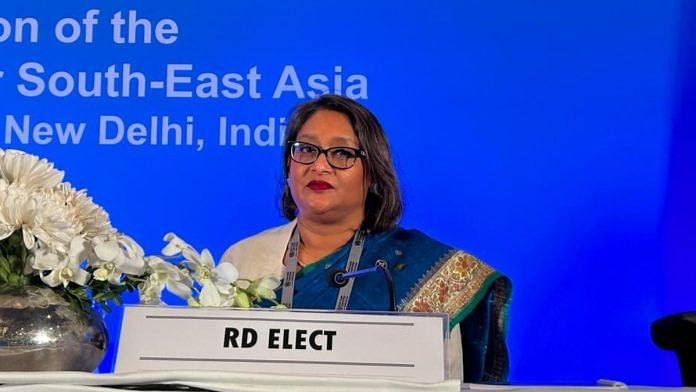New Delhi: Saima Wazed, the daughter of Bangladesh Prime Minister Sheikh Hasina, and an autism activist, was elected the head of the World Health Organisation’s (WHO) Southeast Asia office Wednesday.
She is the first Bangladeshi to hold the post and will take over next February from another pioneer – India’s Poonam Khetrapal Singh, who became the first woman Regional Director of the Southeast Asia Regional Office (SEARO) in 2014.
SEARO was created in 1948 as part of WHO’s regional divisions.
Ten of the 11 member countries — Bangladesh, Bhutan, DPR (North) Korea, India, Indonesia, Maldives, Nepal, Sri Lanka, Thailand, Timor-Leste — took part in the private vote Wednesday. While most countries were represented by their health ministers, Myanmar did not send a delegation and North Korea was represented by its Ambassador to India, Choe Hui Chol.
Wazed won a landslide eight out of 10 votes, defeating her rival from Nepal, Shambhu Prasad Acharya, a public health veteran and a WHO senior official for over three decades.
With a master’s degree in clinical psychology, Wazed has been a member of the WHO’s expert advisory panel on mental health for over nine years, and an adviser to WHO’s director-general on mental health and autism for the past four years. She is also the chairperson of Bangladesh’s National Advisory Committee on Autism and Neurodevelopmental Disorders.
Wazed got the WHO Excellence Award for Public Health in 2014, for her expansive work in creating autism-awareness globally. She was also designated the WHO Champion for Autism in the Southeast Asia Region in 2017.
Both Nepal and Bangladesh had extensively campaigned for their candidates, trying to secure India’s vote in the elections. Throughout the campaign, however, officials from both countries reportedly leveled charges of nepotism and sexism at each other.
Wazed’s candidacy was reportedly marred by controversy since her nomination, with many former officials and health experts questioning her qualifications for the role. Kul Chandra Gautam, a former assistant UN secretary-general, told The Financial Times that the nomination was clearly nepotistic. Wazed hit back, saying the charges were “offensive”.
Bangladesh has also been accused of launching a high-profile campaign to support Wazed. Over the past year, she has accompanied Prime Minister Hasina to a number of international conferences, including the BRICS summit in South Africa, the G-20 summit in Delhi, and the UNGA summit in New York, posting photographs with many world leaders, including U.S. President Joe Biden, Chinese President Xi Jinping, and Prime Minister Narendra Modi.
Edited by Tikli Basu
Also read: WHO South-East Asia Region commits to prioritising investment in primary healthcare



